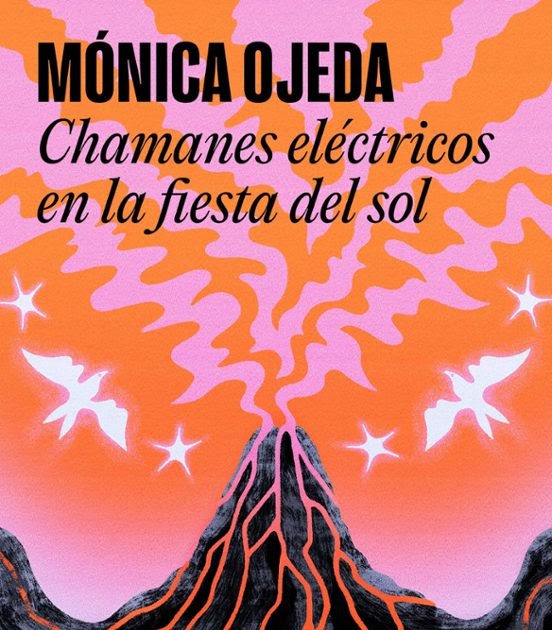
Language: español
Year of publication: 2024
Valuation: I don’t know what to say
Don’t tell me that Electric shamans at the sun festival It doesn’t sound like the name of a progressive neo-rock band, in the style of Derbi Motoreta Burrito Cachimba, although in an Andean style. But it is not… although it could well be, because the first part of this novel takes place during a semi-clandestine musical festival, on the slopes of the Chimborazo volcano, called Ruido Solar, in which rock, punk, neoshamanism, traditional indigenous music (or that imitates it), technocumbias and what do I know what else, and among which are, precisely, the performances of a group called Shamanes Eléctricos… A group of participating girls and boys In this festival they decide, instead of returning to their homes and a reality marked by the violence of drug trafficking gangs, the police and the army and the natural cataclysms themselves, to continue their journey and climb to a volcano full of water to celebrate there the Andean festival of Inti Raymi (the “Festival of the Sun” in Quechua, precisely). Although one of the girls, Noa, also has the goal of meeting her father, who abandoned her when she was little to seclude herself in a hacienda in the middle of the high forest in the area.
The entire novel revolves precisely around Noa, although she is the only character who does not have a voice in it, unlike her adventure companions and her father, whose thoughts we know through a kind of diary. The aforementioned Noa is presented to us readers as both a kind of miracle worker or catalyst of the forces of nature, and as a character with a certain air of Greek tragedy, that of an abandoned daughter who comes in search of her (self) exiled father. not so much to ask for explanations as to provoke a catharsis with his presence. a father who, in turn, appears to us as a mixture of a hermit philosopher, like Diogenes, and Norman Bates (who, in truth, was also a hermit), a model, in any case, of the contemplative life, of self-inquiry introspection, being Noa’s friends (and to continue with the Hellenic references), the representation of the pathos primal, of pantheistic spirituality and the connection with Pacha Mama through music and dance… And of course, this is clear to you from the beginning, because what a blast the kids, friends, readers give/ ace…
Because there is the big drawback that can be put to this novel: that the characters – it is true that each one with their own voices, some more exalted, not to say crazy, than others – insist over and over again on the same themes: the spiritual connection with Father Sun and Mother Earth and above all, with their children the volcanoes; the search for it through musical-dancer debauchery, like modern – or ancient, since it is also about recovering the intuitive wisdom attributed to the indigenous peoples – bacchantes who worshiped in this way everything that there is to worship; the shamanic-psychedelic chatter and its poetic, philosophical and even religious derivatives… In short, a lot, a lot of chatter that ends up becoming the more or less hard crust of a bubble of pretentiousness and smoke that the reader must decide if they prefer. or not to play (it is true that there are a couple of voices, that of Nicole, Noa’s best friend and, to a certain extent, that of Pedro, that go beyond that dialectic and are a relief among so much nonsense.new-wave? neo-indigenist? intoxicated, just like that?). Noa’s father’s speech, for its part, is also a bit overwhelming, but in another sense, that of dusty-mystical self-absorption which, of course, can also be quite unbearable. In the end, one wants Chimborazo to blow up once and for all and bury all these people once and for all… (Just kidding. Peace & Loveie hot).
I suppose it is not necessary, but I would like to make it clear that this pretentiousness to which I allude refers to the speech of the characters in the novel, not to the work of its author (although I already realize that she is the responsible for both choosing said characters and their speech, it is obvious); Quite the contrary, Ojeda’s prose seems excellent and perfectly adequate to characterize each of the characters – something of special relevance since we know them, except for Noa, through her monologues; If the idea is that one or the other will be tiresome or annoying, the author is consistent with their respective idiosyncrasies and makes each of them release the speech correspondent. There is no problem, in principle, but there comes a time when, due to accumulation, things become (for me) a ball. And that, at times and thanks to the persuasion of a literary style and skill that is undoubtedly more than notable, one (me) forgets what did not convince him about the novel and allows himself to be trapped by the magic. (sorry, there is no other way to say it) of skillfully chosen and ordered words, of a well-achieved rhythm and narrative tension and of a story that, at least as far as its plot is concerned, is not uninteresting. Hence my assessment, which may disappoint those looking for a quick and unequivocal opinion on whether or not to approach a book: in this case, I don’t really know what to think. I really say it…
(The cover of the book, yes, is magnificent).
Others (and great books by Mónica Ojeda reviewed in this blog: By denying, Jaw, The flyers
Source: https://unlibroaldia.blogspot.com/2024/05/borrador-monica-ojeda-chamanes.html


